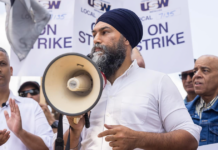Western governments are falling victim to the same bad advice they did on Iran shortly before the overthrow of the Shah, former Canadian prime minister Stephen Harper said.
In remarks to the National Council of Resistance of Iran’s (NCRI) annual Free Iran summit in Paris last weekend, Harper cautioned people against listening to “so-called policy experts in the west.”
“(Regime) change is within reach,” Harper said. “Do not believe the propaganda that the regime is well entrenched. Unfortunately, this line does not come solely from the regime, but also frequently from so-called policy experts in the West.”
Harper specifically called out “analysts who are well read in some area of foreign policy, but because of flawed intellectual frameworks, they consistently misjudge what will happen in foreign affairs.”
Harper likened this to the United States government’s insistence that the Shah had a firm grip on power in the 1970s right up until the revolution that removed him from power and instilled the Ayatollah’s regime.
“One of those consistent misjudgements is to vastly overestimate the strength of regimes that are governed solely by brute force, and to vastly underestimate and to be constantly surprised by the inevitable fragility of such regimes,” Harper said.
The current Iranian regime is far more volatile today than the Shah’s was in the late 1970s, Harper said, calling it a “powder keg that could explode any day by any trigger.”
He also referenced a letter he signed alongside more than 100 other former heads of government and state calling on current world leaders to hold the Iranian regime accountable for its “crimes.”
Speaking of the letter, Harper said the “missing link” of western foreign policy on Iran has been a “failure to reach out to organized Iranian resistance and to support viable alternatives to the regime.”
“It is time to end the decades of silence and inaction by the international community that have helped fuel the culture of violence and impunity among the mullahs and their henchmen,” Harper said. “It is time to hold the leadership of the Islamic Republic accountable for its crimes. It is time to stand in solidarity with the people of Iran in their desire for a free, secular and democratic state.”
The former Canadian prime minister reiterated his call for regime change, promoting the NCRI led by its president-elect Maryam Rajavi, as a democratic alternative.
While Harper said Iranian people must be the ones to overthrow their government, he added that world leaders have a role to play by not strengthening their relations with the “vile regime.”
He touted his former government’s decision to sever diplomatic ties with Iran and close the Canadian embassy in Tehran in 2012.
These comments were echoed by former United States Democrat senator Robert Torricelli, who insisted that regime change “must come from within.”
“The notion of regime change has negative connotations because often it’s been done from the outside, but no one’s suggesting that here,” Torricelli told True North. “Change of the mullahs to a free Iran comes from the Iranian people, but the international community has a role: Don’t subsidize the mullahs, don’t trade with them, don’t give them resources, and don’t legitimize them.”












